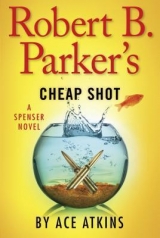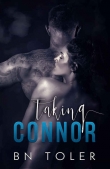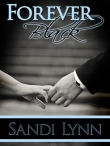
Текст книги "Robert B. Parker's Cheap Shot"
Автор книги: Ace Atkins
Жанр:
Криминальные детективы
сообщить о нарушении
Текущая страница: 4 (всего у книги 17 страниц)
12
Where the hell is my son?” Nicole Heywood said.
The three cops guarding the front door had not been able to restrain her. Nor the maid or Ray Heywood or Detective Lieutenant Lundquist. Even super-agent Steve Rosen could not buffer his client. She was shaking and breathing hard, pumped full of anger and adrenaline.
Kinjo didn’t answer. He sat at a long glass kitchen table, head in hand. His head dropped even more upon her entry. The kitchen was very large and lined with white tile, making everything sound hollow. Nicole stood, hands on hips, shaking and ready to pounce on Kinjo or anyone who got in her way. I hung back.
The two detectives in front of laptop computers stared intently at their screens.
Lundquist looked to me. And I back at Lundquist.
“Can we talk outside?” Lundquist said. “We’re waiting on a call, ma’am.”
“Hell, no,” Nicole said. “Tell me. You tell me, Kinjo. I want to hear what happened from his father.”
“He’s gone,” Heywood said. “I told you. Some men took him as he was on his way to school. We don’t know why.”
“Why the hell would someone take Akira?” she said. “You better tell me right now what’s going on. What the hell did you do now? You just handed over your child?”
“Wasn’t him,” I said. “And they had guns.”
She turned to me, folding her arms over her chest, and stared me down. “Who?”
“Doesn’t matter,” Kinjo said. “They got him. Whoever got him gonna call and I’ll pay them and this will all go away.”
“Damn right it matters.” Nicole put a hand to her mouth and fell to her knees. “Where is that goddamn bitch? I knew she did this. I knew it. What happens when you bring trash into your house.”
I helped her to her feet. She squirmed, trying to run for the door, my arms around her. I loosened my grip, and she slammed an elbow in my stomach and ran for the living room, where Cristal sat watching the news. Cristal looked up and cowered as Nicole launched herself from the doorway. She looked like she could tear Cristal to pieces. I finally caught her, wrapping her in a bear hug and sweeping her out of the room. She turned into me and clawed at my face, let out an unholy scream, and seemed to collapse on herself. Kinjo grabbed her and held her close, pleading to her in a soft, intimate voice. “Baby, we’re doing all we can. We got to be calm. Think of him.”
Lundquist handed me a handkerchief and I dabbed the blood from my face. Rosen helped Nicole to a chair.
The two detectives continued to watch their screens. Nothing to see here. All is well.
“Be calm?” Nicole said. She tried to act strong, but there was a breathless fear in her voice. “I try and leave the bank and two cops show up. They won’t let me. They want to talk, want to know had I heard from my son. Did I know anyone who would want to do him harm? Was I in a good place with my ex-husband? All the while, nobody telling me anything. Not you. Not the cops. Everyone wants me to calm down. Be cool.”
“I got some pills,” Rosen said.
“Fuck your pills, Steve,” she said.
I stood at the kitchen counter. It was a nice kitchen. Lots of chrome and marble and gleaming stainless steel. The refrigerator would have filled half my apartment. I ran my handkerchief under the faucet and wiped my face.
“At this point, we don’t know anything,” Lundquist said. “We’re treating it as a kidnapping and waiting to hear from the kidnappers. We are tapping both the main line here and Mr. Heywood’s two cell phones. We’d like to include your number as well, just in case they reach out to you.”
Nicole reached into her purse and threw a cell phone onto the glass table with a thunk. One of the laptop cops picked up the phone and tapped away on his keyboard.
“Why?”
Kinjo did not answer.
“Why?”
Kinjo did not answer.
“I swear to Christ if she did something that caused this,” she said. “I swear I’ll come after her. I’ll kill her.”
Lundquist lifted his eyes to me. I showed him the bloody handkerchief and nodded in agreement.
“What if they don’t call?” Nicole said.
“They will call,” Kinjo said.
“If they want money,” Lundquist said, “we’ll hear from them.”
Nicole turned her eyes to Kinjo. She held the stare until he looked up.
Cristal entered the room. Nicole did not turn her head, only held up her hand. “If you know what’s good for you,” she said, “you better get gone.”
“I want to help.”
“Do I stutter?” she said. “Get.”
“You’re blaming me?”
“Goddamn right I am,” Nicole said. “Funny how you the last one to see him. Nobody else around. You better take your fake tears and fake tits and get out of my damn face.”
Without a word, but lots of snuffling, Cristal turned on a tall golden heel and skittered away.
“You’ll pay, Kinjo,” she said. “You’ll pay every cent. Me and you both. Every cent to get him back.”
Kinjo nodded. Nicole began to cry. I wanted to place a hand on her shoulder but was concerned she might break it.
“Jesus Christ,” she said, moaning. “Jesus Christ.”
It was Kinjo who got down on one knee before her and held her hand. He was crying, too. Rosen sat down at the head of the table and started to text.
I walked outside to the back patio. The night had grown chilly. The old play fort looked big and skeletal and quiet as hell in the night. Lundquist came outside and closed the French doors behind him. He lit a cigarette.
“What did you get from that?”
“Consider investing in a catcher’s mask?”
“From the exchange?”
I tilted my head. Lundquist burned down the cigarette between his thumb and forefinger.
“Look at the second wife.”
“Natural reaction from the first,” Lundquist said.
“Maybe.”
“You know some things?”
“Probably the same things as you.”
“If this goes the way it often goes, I’ll be living here for the next week.”
“I’ll chip in for some deodorant and mouthwash.”
“I could send some guys to check out those things we both might know,” Lundquist said.
“Or I could go to New York while you check out the second Mrs. Heywood.”
Lundquist nodded. He finished the cigarette and flicked the butt.
“Okay,” he said. “But call from New York if someone from that nightclub thing looks good.”
“Would I ever hold out on you?”
13
Don’t ask me to watch Pearl,” Hawk said. “A man of my talent must draw a line.”
“Is it the poop scooping that bothers you?”
“You want me to carry a bag of shit in a thousand-dollar jacket?”
Hawk wore a knee-length black leather trench over a designer black T-shirt and jeans. His cowboy boots were made of a crocodile’s belly. They were very nice.
“Susan will watch Pearl,” I said.
We sat at the counter of one of the five million Dunkin’ Donuts in the greater Boston metro area. I drank coffee and worked on an old-fashioned; another one waited on deck. Hawk abstained.
“And Z is sticking with Kinjo if he leaves the house,” I said. “His agent requested bodyguard services.”
“He ready?”
I nodded.
Hawk nodded.
“But if he needs help—”
Hawk nodded again.
“If the kidnappers call, I’ll come straight back.”
“No word?” Hawk said.
I shook my head. “Not a syllable.”
“How ’bout I gallivant over to Manhattan,” Hawk said. “And you stay here?”
“Because I’m the dedicated sleuth,” I said. “You’re the heavy.”
“And the brains and the shooter,” Hawk said. “The total package, babe.”
“Nice to be you.”
Hawk’s face showed no emotion. Dull fluorescent light beamed off his bald head. “This one of those deals where we work for free?”
“Nope.”
Hawk’s mouth moved a millimeter into perhaps a smile.
“Our client happens to be loaded,” I said. “You will be compensated for your time and considerable talents.”
“Fucked up to take a kid.”
“Yep.”
“You trust the staties?”
“Lundquist is on it,” I said. “Remember Wheaton?”
Hawk was definitely smiling now.
“So you call me out for donuts at midnight to tell me to stay put?”
“I do not wish to have you gallivanting off to Miami or L.A. or Southeast Asia or wherever else you sometimes go,” I said. “Consider the donuts to be a retainer.”
Hawk nodded. He reached over for the second donut and headed for the door.
I watched the lights punch the night from his Jaguar and the car slide into the dark.
I finished the coffee and drove back to Marlborough Street to pack.
14
The next morning, I took the eight a.m. Acela to Penn Station. I read the Globe and drank coffee as we slowed into New London and raced on to Manhattan.
One of the many advantages of train travel was that I could stash my .38 into my clean underwear along with a couple boxes of ammo. I did not pack much else besides two changes of clothing and a nice blazer in the unlikely event the case called for an elegant meal. I had already left a message for Corsetti, and Corsetti, being Corsetti, would be overjoyed to see me. I told him I had questions on the nightclub shooting from two years ago.
I arrived at Penn Station at eleven-forty-five and took a cab up Eighth Avenue to the Parker Meridien. I unpacked my blazer and underwear. I wore the gun. It went well with my work ensemble of navy T-shirt, A-2 jacket, jeans, and New Balance sneakers. Fifteen minutes later, I found Eugene Corsetti sitting at his desk, about to attack a forlorn Twinkie. A nameplate stated he was a detective, first grade.
“Jeez, is everyone getting a promotion?”
“Jesus Christ.”
“Nope,” I said. “Just me.”
“Jesus.”
“With the promotion, can’t you eat any better?”
Corsetti stood, which did little, since he stood only about five-foot-six or -seven. It was more his girth that filled the room. Corsetti was built like a bowling ball.
“I’ll buy you lunch.”
He dropped the Twinkie in the wastebasket and we shook hands.
“Sure, I remember the case,” he said. “Pats player involved in a first-class clusterfuck.”
“I need a few more details than that.”
“Didn’t you pull the file?”
“I got the face sheet and the initial report,” I said. “But no transcripts. I need the transcripts.”
“Of course you do,” he said. “Can we make it quick, sir? You know, I do work other cases between our meetings.”
He reached for a satin Yankees warm-up jacket. Despite his questionable wardrobe, we had remained friends for many years.
We walked around the corner to East 45th and a hot dog stand that also served gyros and falafel. I bought us each a dirty-water dog and a Coke.
“May I ask why a hotshot Boston gumshoe is interested in a two-year-old homicide?”
“Background.”
“Background?” Corsetti said. “Okay. Sure. Sure. Like I don’t read the freakin’ papers. Kinjo Heywood?”
He spilled some mustard on his blue satin jacket.
“I can replace that dud with something from Yawkey Way.”
“I’d rather set fire to my nuts,” he said.
“Dedication.”
He dotted away the mustard. I demonstrated the proper way to eat a hot dog, ending up with only some loose onion on my sleeve. I pinged them away with a flick of my index finger.
“Wasn’t my case,” Corsetti said. “But I did a few interviews for the lead. Not enough to go to the grand jury—.45 shell casings at the scene. We dusted the shit out of a Ford Escape with chrome rims that belonged to the deceased. No prints. No witnesses at the scene. Or at least no witnesses who would talk. No gun. Circumstantial with a capital C.”
“What about the victim?” I said. “Antonio Lima?”
“Young guy from some island somewhere.”
“Cape Verde.”
“If you say so,” he said. “I remember cars and faces.”
“And Mr. Lima gets into it with Mr. Heywood at Chrome.”
“Now, there’s a fucking place,” Corsetti said. “You been there yet?”
“Next on my list.”
“They got women in lingerie and angel wings who bring you cocktails.”
I drank some Coke. I finished the dog. “Everyone who brings me a cocktail is an angel.”
“I never talked to Kinjo Heywood,” he said. “I’ve seen him on TV and when they play the Jets. He’s the toughest linebacker since Dick Butkus or Ray Nitschke. I’ll get you his interview transcript if you really want it. But it’s probably a hundred pages of him lawyering up.”
I nodded. “And the victim?”
“Nice family, bad kid,” he said. “What can you say? Moved to the city from somewhere else. Mom’s an immigrant with two boys. Runs a little grocery. Can’t believe her son is a gangbanger, even though she’s bailed him out of trouble maybe fifteen times.”
Corsetti’s collared shirt was wide open. Corsetti needed an open collar; his neck was bigger than his head.
“So you have more suspects than Kinjo Heywood?”
“We liked him for it,” he said. “An hour or two before the shooting, Heywood and Lima got in a scuffle in the men’s room. We had witnesses at one time, but then they flaked. Some bullshit over a broad.”
“One of the lingerie angels?”
“How’d you guess?”
“How could he resist?” I said. “You have her interview and a transcript?”
“Gee,” Corsetti said. “You think we should’ve talked to her? Yeah, sure. I’ll send it to you and let you know if there’s something worthwhile in there. I mean, that’s the least I can do for a long-suffering Sox fan.”
“New Yorkers are never short on charisma.”
We walked back toward the station. Corsetti continued to dab the stain on his jacket. We tried to walk side by side, but being big guys, we would have impeded the sidewalk traffic flow.
“Can I ask you something?” Corsetti said.
“Working out and taking supplements.”
“What?”
“You were going to ask how I stayed looking so young and fit.”
“No,” he said. “The whore. What ever happened to the case with the whore that kept going missing?”
“April Kyle.”
“Yeah,” Corsetti said. “Kyle.”
“Her story did not end well.”
He studied my face as we walked. He nodded and didn’t ask again.
15
Antonio Lima’s mother ran a corner grocery in Yonkers specializing in African and Caribbean food. Besides the spices and rare produce, I could tell no difference in their toilet paper, aspirin, chewing gum, condoms, and coffee. I complimented the clerk on her plantains and star fruit. In turn, she told me Mrs. Lima lived in a walk-up directly above the store.
Mrs. Lima was a stout, light-skinned black woman in a blue flowered housecoat and a scarlet head scarf. When I mentioned Antonio, she started to close the door. “Leave us alone.”
“I’m not a reporter or a cop.”
“What are you?”
I had many answers but kept quiet and passed my card through the door. It was the one with my name, occupation, and the logo of Saint George and the Dragon.
“What do you want?”
“May I come in?” I said. “I promise not to take long. I need to speak to your son.”
“What?”
“Victor,” I said. “He may be able to help me.”
She closed the door, but as I began to walk away, I heard the chain unlatch.
She let me in and followed me into an open kitchen. Nearby, an older and more wrinkled version of Mrs. Lima sat in an easy chair, watching a newscast in Portuguese from Rio. She wore a similar yellow head scarf and glanced at me once and turned back to the television. The room’s walls were made of fading plaster hung with cheap frames of family, popes, and various saints. The sitting room had a view of downtown Yonkers and where the new minor-league baseball stadium was supposed to be built. Two bedrooms and an open kitchen connected. On a chopping board next to the stove a half-sliced onion and quartered lime waited.
“Antonio?”
“I’m very sorry,” I said.
“He was a good boy.”
I nodded, knowing all victims are good. Even if they had multiple priors of aggravated assault and burglary. A shrine had been set up on a small kitchen table, complete with prayer candles. I recognized the same school photo as the one that ran in the Times and Post.
“Your son’s driver’s license shows this address.”
“Victor does not want to discuss his brother anymore,” she said. “Why do you want to know?”
I could tell her that the man suspected in the murder of her son had hired me. Or I could tell her a blanched version of the truth.
“I’m being paid to find out what happened.”
The older woman turned to me and back to the television. I did not speak Portuguese, but there seemed to be a hell of a soccer match last night somewhere. She did not ask why or by whom, and I quickly moved on to the next question.
“I have not spoken to Victor for many weeks,” she said. “He works for a moving company in the city. I don’t have his address.”
“His phone number?”
She looked away and shook her head.
“Any friends or family who’d know? A girlfriend?”
She shook her head some more.
“Has he told you much about that night?”
“He said that football player killed his brother,” she said. “He said they were fighting over a woman and that the man and Antonio were very drunk. He said Antonio left this nightclub and the man followed him and shot him in his car.”
“What did the police tell you?”
“The police said they had no proof,” she said. “But two men were fighting and an hour later one is dead? What do you think?”
“I know your son did business with some dangerous people.”
“Lies.”
“I still would like to speak to Victor.”
She settled into her seat and glanced at the unfinished meal in the kitchen. “He did not see it. He came after. He was with a woman, too. Women, all these women, have caused trouble for my boys for so long.”
“Did you know the woman they fought over?”
“No,” she said. “But I think she was Cape Verdean. Victor knows her. She is loose and without morals.”
“I try my best to stay away from women like that,” I said. “Can you please help me? It’s very important I talk to him.”
“Why? It will change nothing,” she said. “This man, the football player, is very rich and very respected and probably paid the police.”
“The police said there were no witnesses or evidence.”
Mrs. Lima was silent. The newscast spoke of demonstrations in São Paulo. I stayed here any longer and I’d be fluent in Portuguese. The droning voice of newscasters was pretty much the same in any language and filled the silence.
“If Victor calls, will you at least give him my number?” I said. “Let him decide.”
“I must get back to preparing dinner.”
“Did your son know this man before?” I said. “The man you believe shot him.”
“No.”
“Was anyone else with your son that night?” I said. “Other friends besides his brother?”
“I don’t know,” she said. “I don’t know. I have prayed a very long time to help with my pain. This brings things back to me. Can we please stop this unless you come here with answers for us? What good will these questions do?”
I took a long breath. I let it out. “There is a child that’s gone missing,” I said. “The police think the shooting of your son may be connected. The boy is only eight years old.”
“Is it not enough to let the killer of my son go free?” she said. “And now you have come to my house with more lies? You insult my one son who lives. These are my boys. My children.”
I nodded and stood. I smiled and left my card on the counter.
The old woman watching television never looked up. Mrs. Lima went back to slicing onions.
16
I was sitting in a coffee shop on Washington Street that faced Chrome. I had packed little to go nightclubbing and had to settle for a black button-down shirt and Levi’s. I left the two top buttons undone. Perhaps I should have invested in tighter pants or a gold chain. Reviews I read stated I was not the desirable demographic for Chrome. They preferred young and hip as opposed to middle-aged and thuggish.
But there was little else to do. Lundquist said no ransom demands had been sent or contact made. He said Cristal Heywood was a flake but didn’t appear to be involved. After my visit with Corsetti, I had spent most of my day running down addresses on Victor Lima. I came up with two associated persons. One led to an empty apartment in Queens. The second led to an angry ex-girlfriend in Brooklyn who had not seen Victor in two years, well before the shooting.
As I pondered, a homeless guy wandered in and sat down directly across from me. He ordered a cup of hot water and began to unpack several pairs of old socks from a grocery bag. I hoped he didn’t need the socks to make tea.
I returned to the transcripts I got from Corsetti, witnesses from that night, including the woman at the center of the scuffle. Lela Lopes. But even if she offered me photos, a video confession, and a smoking gun to prove Kinjo was involved, that did not mean the kidnapping was personal.
I wasn’t even sure if Lopes still worked at Chrome. Or lived in New York. I could find nothing in a database I sometimes used.
I turned to the muttering homeless man. “Do you know anything about Lela Lopes?”
“Eat me.”
“‘The words of the prophets are written on the subway walls.’”
He scowled and sipped his hot water. I watched Chrome through the window. As soon as I had something, I would head back to Boston. This was something. It was all there was right now to help Akira. I could sit in the Heywood house in Chestnut Hill drinking coffee and looking earnest with the staties and offering reassurances to Nicole and Kinjo. Or I could keep moving. Keep moving usually worked for me.
At nine, a very beautiful blonde in a tight black T-shirt opened up the front door to Chrome as honest-to-God velvet ropes were set along the sidewalks. I strolled across Washington to make a personal appearance.








